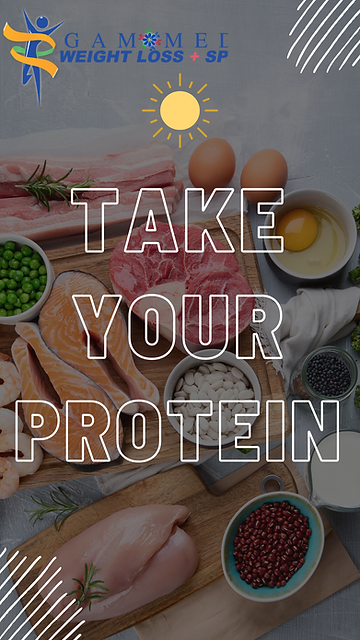In the quest for weight loss and improved overall health, people often adopt various strategies and dietary approaches. While there’s no one-size-fits-all solution, incorporating lean protein into your diet can be a game-changer. Lean protein offers numerous benefits that extend beyond weight management, positively impacting your body composition, metabolic function, and overall well-being. In this article, we delve into the importance of lean protein for weight loss and patient health in general, exploring its role in supporting your journey toward a healthier, fitter you.

Building Blocks of a Healthy Body:
Proteins are the building blocks of life, serving as critical components of cells, tissues, and organs. Consuming lean protein ensures you have an adequate supply of essential amino acids, which are vital for repairing and building tissues, promoting muscle growth, and facilitating proper organ function. When combined with regular exercise, a diet rich in lean protein helps preserve and build lean muscle mass, which is vital for boosting metabolism and supporting long-term weight management.
Satiety and Reduced Cravings:
One of the most significant challenges in weight loss is managing hunger and cravings. The good news is that lean protein can be a powerful ally in curbing these cravings and promoting feelings of fullness. Compared to carbohydrates and fats, protein takes longer to digest, keeping you satisfied for longer periods. This reduced appetite can help prevent overeating, snacking on unhealthy foods, and ultimately contribute to calorie control, making weight loss efforts more successful.
Increased Calorie Burning:
Did you know that your body expends more energy to digest and metabolize protein compared to fats and carbohydrates? This phenomenon is known as the thermic effect of food (TEF). By consuming lean protein, you can boost your metabolic rate temporarily, as the body works harder to break down protein and absorb its nutrients. This means that a portion of the calories you consume from lean protein is burned off during digestion, providing a slight metabolic advantage that aids weight loss efforts.
Blood Sugar Regulation:
Maintaining stable blood sugar levels is crucial for overall health and weight management. High-glycemic foods can lead to blood sugar spikes, followed by crashes, which can trigger cravings and interfere with weight loss goals. Lean protein, however, has a minimal impact on blood sugar levels. When consumed alongside carbohydrates, it slows down the digestion process, resulting in a more gradual release of glucose into the bloodstream. This can help prevent blood sugar fluctuations and contribute to better appetite control and weight management.
Nutrient Density and Health:
Lean protein sources, such as skinless poultry, fish, lean meats, eggs, legumes, and low-fat dairy products, are not only rich in protein but also packed with essential nutrients. They provide valuable vitamins, minerals, and antioxidants that support overall health and vitality. A well-rounded diet incorporating lean protein can enhance immune function, improve bone health, promote healthy skin, and support a host of other physiological processes, beyond just weight loss.
Conclusion:
When it comes to weight loss and patient health in general, lean protein holds immense value. Its ability to promote satiety, preserve lean muscle mass, enhance metabolism, stabilize blood sugar levels, and deliver essential nutrients makes it an invaluable component of a balanced diet. By incorporating lean protein sources into your meals and snacks, you can optimize your weight loss efforts, promote long-term weight management, and improve your overall health and well-being. Remember, consult with a healthcare professional or a registered dietitian to personalize your diet and ensure it aligns with your specific needs and goals. Here’s to a healthier, fitter you!
Disclaimer: This blog post is for informational purposes only and does not constitute medical advice. Please note that the information provided in this blog post is for informational purposes only and does not constitute medical advice. It is always recommended to consult with a healthcare professional or a registered dietitian before making any significant changes to your diet or exercise routine.
Additional Tips for Incorporating Lean Protein:
1. Opt for a Variety of Lean Protein Sources: To enjoy the full range of nutrients and flavors, diversify your sources of lean protein. Include options such as skinless poultry, fish, lean cuts of meat, eggs, legumes, tofu, tempeh, and low-fat dairy products in your diet.
2. Mind Your Portion Sizes: While lean protein is beneficial, it’s essential to maintain balance. Be mindful of portion sizes to avoid consuming excessive calories. Aim for a serving size that fits your individual needs and goals.
3. Combine Lean Protein with Fiber-Rich Foods: Boost the nutritional value of your meals by combining lean protein with fiber-rich foods like vegetables, whole grains, and legumes. This combination enhances satiety, aids digestion, and supports overall health.
4. Choose Healthy Cooking Methods: Opt for cooking methods such as grilling, baking, steaming, or sautéing, rather than deep-frying or breading, to prepare your lean protein. This helps minimize added fats and calories while retaining the natural flavors.
5. Plan Ahead and Be Prepared: Incorporating lean protein into your meals requires planning. Prepare your meals in advance, pack protein-rich snacks, and have a variety of lean protein options readily available to make healthier choices throughout the day.
Remember, every individual is unique, and what works for one person may not work for another. Personalization and finding a sustainable approach to nutrition and weight loss are key. By working with a healthcare professional or a registered dietitian, you can create a tailored plan that aligns with your specific needs, preferences, and goals.
In conclusion, lean protein is a valuable component of a weight loss journey and overall patient health. Its ability to promote satiety, support muscle growth, boost metabolism, regulate blood sugar levels, and provide essential nutrients makes it an indispensable part of a balanced diet. Embrace the power of lean protein, and take a step toward achieving a healthier lifestyle and improved well-being.





